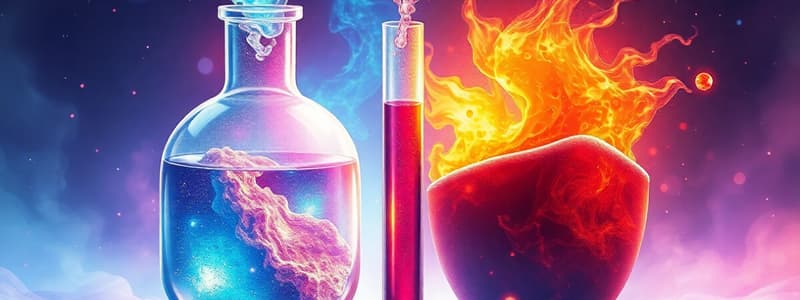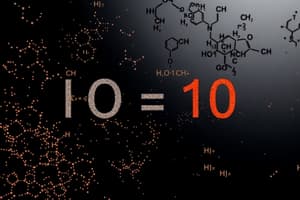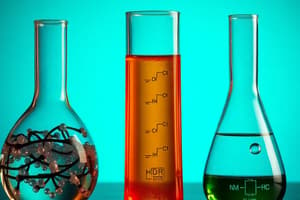Podcast
Questions and Answers
What differentiates nascent hydrogen from molecular hydrogen in terms of its reducing ability?
What differentiates nascent hydrogen from molecular hydrogen in terms of its reducing ability?
- Nascent hydrogen is produced during some chemical reactions. (correct)
- Molecular hydrogen has a stronger affinity for oxygen.
- Nascent hydrogen is less reactive than molecular hydrogen.
- Nascent hydrogen contains additional neutrons.
Which of the following oxides is classified as amphoteric?
Which of the following oxides is classified as amphoteric?
- NO
- SO3
- CaO
- Al2O3 (correct)
Which of the following isotopes of hydrogen is known to be radioactive?
Which of the following isotopes of hydrogen is known to be radioactive?
- Hydrinium
- Protium
- Tritium (correct)
- Deuterium
What is the main determinant of the amount of product formed in a chemical reaction?
What is the main determinant of the amount of product formed in a chemical reaction?
Which of the following statements most correctly defines an oxide?
Which of the following statements most correctly defines an oxide?
Flashcards
What is nascent hydrogen?
What is nascent hydrogen?
Nascent hydrogen is a highly reactive form of hydrogen atoms that are freshly generated, making it a stronger reducing agent than molecular hydrogen (H2).
Why is nascent hydrogen a more powerful reducing agent?
Why is nascent hydrogen a more powerful reducing agent?
Nascent hydrogen is more reactive because it exists as single, highly energized atoms, ready to donate electrons and reduce other substances. Molecular hydrogen, on the other hand, is more stable and requires more energy to break its bond, making it less reactive.
What are oxides?
What are oxides?
Oxides are chemical compounds formed when oxygen combines with another element.
What are amphoteric oxides?
What are amphoteric oxides?
Signup and view all the flashcards
What are isotopes?
What are isotopes?
Signup and view all the flashcards
Study Notes
Nascent Hydrogen
- Nascent hydrogen is a more powerful reducing agent than molecular hydrogen.
Rutherford's Alpha-Ray Scattering Experiment
- Identify the different parts of the sketch.
- List the key observations in the experiment.
- Describe the conclusions from the experiment.
Classification of Oxides
- Oxygen reacts with metals and non-metals to form oxides
- Oxides can be acidic, alkaline, neutral, or amphoteric.
- Classify examples of oxides (NO, SO3, CaO, PbO)
- Explain the amphoteric nature of Al2O3.
- Define oxides.
Isotopes of Hydrogen
- Isotopes are different forms of an atom with the same atomic number but different atomic masses.
- Identify the isotopes of hydrogen.
- Identify the radioactive hydrogen isotope.
- List two uses of tritium.
- List one use of heavy water.
Limiting Reactant
- The amount of product formed in a chemical reaction is determined by the limiting reactant.
- Identify the limiting reactant in the given chemical reaction (CaCO3 + 2HCI → CaCl2 + H2O + CO2.)
Studying That Suits You
Use AI to generate personalized quizzes and flashcards to suit your learning preferences.




